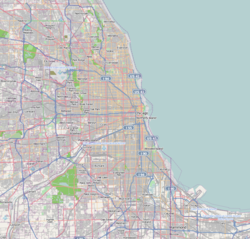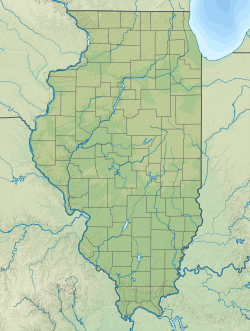Willow Springs, Illinois
Willow Springs, Illinois | |
|---|---|
 Old Willow Shopping Center on Archer, by the Palos Forest Preserves | |
 Location of Willow Springs in Cook County, Illinois. | |
| Coordinates: 41°44′15″N 87°52′40″W / 41.73750°N 87.87778°W | |
| Country | United States |
| State | Illinois |
| Counties | Cook, DuPage |
| Townships | Lyons, Palos, Lemont, Downers Grove |
| Area | |
• Total | 4.25 sq mi (11.02 km2) |
| • Land | 4.15 sq mi (10.75 km2) |
| • Water | 0.10 sq mi (0.27 km2) |
| Elevation | 594 ft (181 m) |
| Population (2020) | |
• Total | 5,857 |
| • Density | 1,411.67/sq mi (545.00/km2) |
| Time zone | UTC-6 (CST) |
| • Summer (DST) | UTC-5 (CDT) |
| ZIP Code(s) | 60480 |
| Area code(s) | 708/464, 630/331 |
| FIPS code | 17-82049 |
| GNIS feature ID | 2399701[2] |
| Website | www |
Willow Springs is a village in Cook County, Illinois, United States, with a small portion extending into DuPage County.[2] The village was founded in 1892 and was named for the springs along the Des Plaines River. In 2020, the population was 5,857.[3]
Geography
[edit]Willow Springs is located on the banks of the Des Plaines River and the Chicago Sanitary and Ship Canal, adjacent to the Palos Forest Preserves.[4]
According to the 2021 census gazetteer files, Willow Springs has a total area of 4.25 square miles (11.01 km2), of which 4.15 square miles (10.75 km2) (or 97.55%) is land and 0.10 square miles (0.26 km2) (or 2.45%) is water.[5]
Neighboring communities are Hickory Hills, Justice, Hodgkins, and Burr Ridge.
Demographics
[edit]As of the 2020 census[6] there were 5,857 people, 2,303 households, and 1,494 families residing in the village. The population density was 1,377.15 inhabitants per square mile (531.72/km2). There were 2,545 housing units at an average density of 598.40 per square mile (231.04/km2). The racial makeup of the village was 81.85% White, 1.33% African American, 0.38% Native American, 3.45% Asian, 0.02% Pacific Islander, 3.93% from other races, and 9.05% from two or more races. Hispanic or Latino of any race were 12.21% of the population.
There were 2,303 households, out of which 27.1% had children under the age of 18 living with them, 57.27% were married couples living together, 5.08% had a female householder with no husband present, and 35.13% were non-families. 28.88% of all households were made up of individuals, and 10.94% had someone living alone who was 65 years of age or older. The average household size was 3.09 and the average family size was 2.44.
The village's age distribution consisted of 21.4% under the age of 18, 3.8% from 18 to 24, 22.9% from 25 to 44, 30.8% from 45 to 64, and 21.1% who were 65 years of age or older. The median age was 46.1 years. For every 100 females, there were 99.2 males. For every 100 females age 18 and over, there were 96.4 males.
The median income for a household in the village was $98,664, and the median income for a family was $123,531. Males had a median income of $61,136 versus $58,704 for females. The per capita income for the village was $51,333. About 3.1% of families and 2.6% of the population were below the poverty line, including 2.6% of those under age 18 and 2.3% of those age 65 or over.
| Race / Ethnicity (NH = Non-Hispanic) | Pop 2000[7] | Pop 2010[8] | Pop 2020[9] | % 2000 | % 2010 | % 2020 |
|---|---|---|---|---|---|---|
| White alone (NH) | 4,542 | 4,794 | 4,679 | 90.35% | 86.78% | 79.89% |
| Black or African American alone (NH) | 36 | 56 | 77 | 0.72% | 1.01% | 1.31% |
| Native American or Alaska Native alone (NH) | 5 | 0 | 15 | 0.10% | 0.00% | 0.26% |
| Asian alone (NH) | 93 | 145 | 202 | 1.85% | 2.62% | 3.45% |
| Pacific Islander alone (NH) | 0 | 0 | 0 | 0.00% | 0.00% | 0.00% |
| Other race alone (NH) | 0 | 2 | 15 | 0.00% | 0.04% | 0.26% |
| Mixed race or Multiracial (NH) | 97 | 56 | 154 | 1.93% | 1.01% | 2.63% |
| Hispanic or Latino (any race) | 254 | 471 | 715 | 5.05% | 8.53% | 12.21% |
| Total | 5,027 | 5,524 | 5,857 | 100.00% | 100.00% | 100.00% |
| Census | Pop. | Note | %± |
|---|---|---|---|
| 1900 | 378 | — | |
| 1910 | 334 | −11.6% | |
| 1920 | 134 | −59.9% | |
| 1930 | 733 | 447.0% | |
| 1940 | 948 | 29.3% | |
| 1950 | 1,314 | 38.6% | |
| 1960 | 2,348 | 78.7% | |
| 1970 | 3,318 | 41.3% | |
| 1980 | 4,147 | 25.0% | |
| 1990 | 4,509 | 8.7% | |
| 2000 | 5,027 | 11.5% | |
| 2010 | 5,524 | 9.9% | |
| 2020 | 5,857 | 6.0% | |
| U.S. Decennial Census[10] 2010[8] 2020[9] | |||
Government
[edit]Most of Willow Springs is in Illinois's 3rd congressional district, while the northwestern portion is in the 6th district. The current mayor is Melissa Neddermeyer. The current Board of Village Trustees are: Michael Kennedy (Term Expires 2025); Rick Mika (Term Expires 2025); Tom Arra (Term Expires 2025); Terrence M. Carr (Term Expires 2027); Ernie Moon (Term Expires 2027); and Fred Posch (Term Expires 2027).
Education
[edit]Public elementary and middle school students living south of the Des Plaines River and the canals attend Willow Springs School District 108, while those living north attend Pleasantdale Elementary and Pleasantdale Middle School in Pleasantdale School District 107.[11] At the high school level, all District 107 students move onto Lyons Township High School (District 204) in La Grange/Western Springs, IL. Some District 108 students move onto Argo Community High School (District 217) in Summit, Illinois. Another portion of District 108 students attend Amos Alonzo Stagg High School (Consolidated High School District 230) in Palos Hills, Illinois.[12] Trinity Lutheran School is also in the area.[11]
The College of DuPage serves residents north of the river while Moraine Valley Community College serves those south of the river.[11]
Infrastructure
[edit]Transportation
[edit]Willow Springs station is on Metra's Heritage Corridor line, which provides weekday rail service between Joliet and Chicago Union Station.
Pace provides bus service on Route 390 connecting Willow Springs to Burbank, Chicago, and other destinations.[13]
Movie location
[edit]Willow Springs was used as a set location for the film The Lake House, starring Sandra Bullock and Keanu Reeves.[14] Some locations in Willow Springs Il were used in filming scenes for the Amazon TV series Night Sky and for Sonny Malhi’s 2015 debut horror feature Anguish.
References
[edit]- ^ "2020 U.S. Gazetteer Files". United States Census Bureau. Retrieved March 15, 2022.
- ^ a b U.S. Geological Survey Geographic Names Information System: Village of Willow Springs
- ^ "Willow Springs village, Illinois". United States Census Bureau. Retrieved April 15, 2022.
- ^ willowsprings-il.gov About Willow Springs Retrieved December 10, 2019
- ^ "Gazetteer Files". Census.gov. United States Census Bureau. Retrieved June 29, 2022.
- ^ "Explore Census Data". data.census.gov. Retrieved June 28, 2022.
- ^ "P004: Hispanic or Latino, and Not Hispanic or Latino by Race – 2000: DEC Summary File 1 – Willow Springs village, Illinois". United States Census Bureau.
- ^ a b "P2 Hispanic or Latino, and Not Hispanic or Latino by Race – 2010: DEC Redistricting Data (PL 94-171) – Willow Springs village, Illinois". United States Census Bureau.
- ^ a b "P2 Hispanic or Latino, and Not Hispanic or Latino by Race – 2020: DEC Redistricting Data (PL 94-171) – Willow Springs village, Illinois". United States Census Bureau.
- ^ "Decennial Census of Population and Housing by Decades". US Census Bureau.
- ^ a b c "Schools." Willow Springs. Retrieved January 20, 2017.
- ^ "Attendance Areas Archived February 2, 2017, at the Wayback Machine." Consolidated High School District 230. Retrieved January 19, 2017.
- ^ "RTA System Map" (PDF). Retrieved January 30, 2024.
- ^ "Filming Location Matching "Willow%20Springs,%20Illinois,%20USA" (Sorted by Popularity Ascending)". IMDb.com. Retrieved December 4, 2022.






